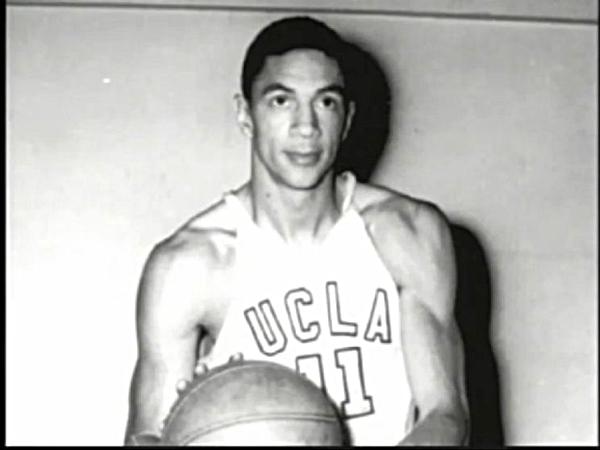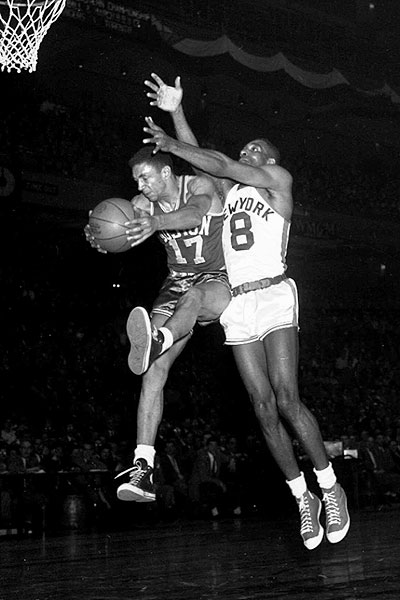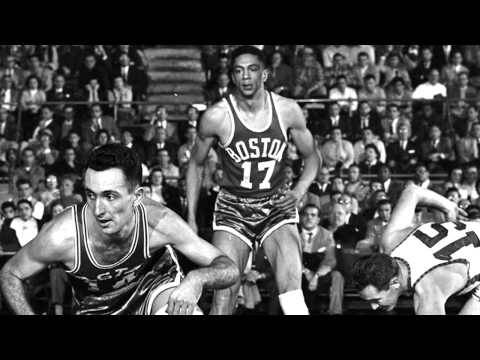
While at UCLA, Barksdale became the first black college basketball player to be named to the All-American team.

Even though white teammates did not pass black players the ball often, Barksdale was still a star in the NBA, and he was the first black player to be named to the NBA All-Str team.

When Barksdale was traded from the Baltimore Bullets to Boston in 1952, he became the first black player to play for the Celtics.
Barksdale was the first black NCAA basketball All-American, the first black to play on the USA Olympic basketball team, and the first black to be named to the NBA All-Star game.
By Jason Lewis
Sentinel Sports Editor
jasonl@lasentinel.net
About eighty percent of the players in the NBA are black, and they all play above the rim. That has been the norm for a good 50 years. But the league did not use to be like that. The league used to be made up of all white players, and most of them played below the rim. At some point in time there was a shift to what we have known the NBA to be, and one player who was instrumental to the game changing was Don Barksdale.
Barksdale had a lot of speed and he was one of the first players that could “jump out of the gym.” Like players today he could play above the rim, he had great moves under the basket, and he could get up and down the court faster than just about anybody during his time. He was one of the few players who played the game as we know it today.
The landscape of sports was slowly changing as Jackie Robinson (UCLA) broke baseball’s color barrier and Kenny Washington (UCLA) broke the NFL color barrier, both in 1947. In basketball, it was Barksdale who was opening the doors for black players.
The road for Barksdale was not easy. Born in Oakland in 1923, he was not allowed to play on the Berkeley High School basketball team because the head coach had a quota for black players. He only allowed one at a time on the team, which was not Barksdale.
That did not stop Barksdale, who refined his basketball skills on local playgrounds and in park leagues. After graduating from high school, he played for two years at Marin Junior College, and he earned a scholarship at UCLA.
Standing at 6-6, Barksdale played center and he helped lead UCLA to a Pacific Coast Conference championship. He played mostly with, and against, white players. Because he was taller, faster, and could jump higher, he dominated his competition and he became the first black college basketball player to be named to the All-American team.
Barksdale was teammates with another black player, Davage Minor, who went on to become the first freshman to be named to the All-American team in 1947.
Both Barksdale and Minor were also on the track team, where Barksdale was a standout as a triple jumper.
One of Barksdale’s teammates on the track team was Arthur Lewis (Jefferson High School), who remembers how athletically gifted Barksdale was.
“He was a superior athlete, definitely,” Lewis said. “He’d win most of his events in track. He had very good running abilities, and in basketball he could get up and down the court like Wilt Chamberlain for example. He was probably the best basketball player that UCLA ever had up until that point.”
Barksdale also dominated the Frat Games in Los Angeles as a member of Alpha Phi Alpha Fraternity, Inc. He was Line Brothers with Lewis as they were made through the Alpha Delta Chapter (USC) in 1946. At the time Alpha Delta was the only chapter in Los Angeles, so students from other schools crossed through that chapter. A year later Barksdale, Minor, Lewis, and a number of other Alphas chartered the Gamma Xi Chapter at UCLA.
Barksdale and Minor were also teammates on the Alpha team, which won the championship the year that they played.
After graduating from UCLA, Barksdale became the first black player to be named to the USA Olympic basketball team. Before the Olympics the team played an exhibition game against the University of Kentucky, making Barksdale the first black player to play against that school. He was not allowed to stay at the hotel with the rest of the team, and he received death threats if he had taken the court. That did not stop him, and the Olympic team went on to win all 12 games and the gold medal at the 1948 London Games.
After the Olympics, Barksdale returned to Oakland because the NBA was not signing black players. Major League Baseball and the NFL had recently been integrated, but basketball was lagging behind. Barksdale started a radio broadcasting career, and he became the first black radio disc jockey in the San Francisco Bay area. He did television work, and he owned a beer distributorship.
At that time the NBA started calling, as they were looking to finally start to sign black players, but Barksdale turned down the first offers because he was already making more money than most NBA players. After a couple years the NBA’s offer was so great that he could not turn them down. In 1951, a year after four black players broke the NBA’s color barrier, he signed a contract with the Baltimore Bullets that made him one of the highest paid players in the league.
Barksdale was an instant hit in the NBA, even though white teammates were reluctant to pass him and the other black players in the league the ball. In 1953 he became the first black person to be named to the All-Star game. He was then traded to the Boston Celtics, making him the first black person to play for that team. His career was cut short due to injuries, and he played his last game in 1955.
Barksdale went on to have a successful career in radio, and he owned a record label and a couple nightclubs in Oakland. He is a founding member of the Cosmos, which is a social club in Los Angeles. He created California’s Save High School Sports, which was a program that raised money for high school athletic programs. He passed away at the age of 69 in 1993. He is not as well known as many NBA legends, but he certainly opened the door for many of them.






